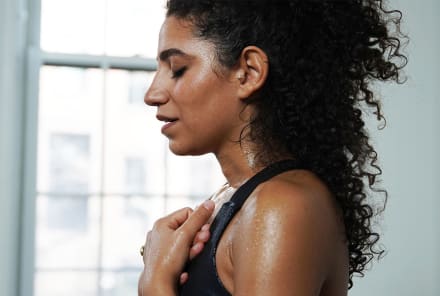Advertisement
How To Power Through Your Day When You Didn’t Get Good Sleep — Tips From Experts


Most professional athletes have some kind of wind-down routine. For Team USA beach volleyball star Taryn Kloth, it’s all about clearing the mind, especially the night before a big match.
“What I’ve started to do is I always bring a book and my journal with me when I travel. I journal for only about five minutes, but it’s just about getting every single thought or worry out of my head. Once it’s written down, then it leaves my head,” she told us in a previous Game On interview.
Journaling? Check. White noise? Probably a good idea. But what happens when, with all of these sleep hygiene tips included, you just can’t clock a good night of sleep? How can you power through the next day, or even an important event, on less-than-ideal shut-eye?
To find out, I went straight to the experts—sleep physicians and athletic pros. Below, what you need to know about having a good day after a bad night. Plus, their rapid-fire wind-down tips you don’t want to miss.
Meet the experts
Maricris Lapaix, C.P.T
Maricris Lapaix, C.P.T is a certified personal trainer whose goal is to inspire my global community to MOVE & PLAY through experiential fitness.
Jade Wu, Ph.D
Jade Wu, Ph.D is a sleep medicine specialist and author of Hello Sleep.
Shelby Harris, Psy.D
Shelby Harris, Psy.D. is a clinical psychologist, Board Certified Sleep Psychologist, and author of A Woman’s Guide To Overcoming Insomnia.
But first, what role does sleep play in performance?
First, let’s refresh: Why is sleep so important for athletic performance?
“The mental and physical preparation takes a toll on the body and requires time to recuperate,” explains certified personal trainer Maricris Lapaix, C.P.T. What’s more, she adds, “Inadequate sleep can affect the mental focus and clarity an athlete should have to perform at their best and make quick game-time decisions.”
So for your body, your mind, and your game, good sleep is important. Does this mean you can’t recover from a sleepless night? Not at all.
4 tips for powering through a bad of sleep
In fact, there are many ways to rejuvenate your energy, both mentally and physically.
Nap strategically
Sleep medicine specialist Jade Wu, Ph.D. starts off with something that may be controversial, stating that, “Naps are an athlete's secret weapon.”
Wu explains that naps can boost energy and cognitive function, especially when you’re low on sleep. “The main thing to be aware of is that performance tends to temporarily drop for about 30 minutes after waking from a nap (this is called ‘sleep inertia1’’), so a nap is good as long as it doesn't happen too close to the start of a big event.”
Extra tip:
Drink coffee an hour before your event
Speaking of caffeine, when is the best time to drink it before a big game?
“I generally recommend about an hour before, if possible, to allow it time to be digested and do its work,” says clinical psychologist and sleep specialist Shelby Harris, Psy.D.
If your event is late in the evening, you’ll have to make a choice—drinking coffee an hour before may help your performance and mental clarity, but it may also dampen your sleep quality post-game. Is it worth it? You decide.
Try a mindful meditation
Wu also recommends making time for mindfulness meditation at some point during the day.
“This is not the same as sleep, but it can often confer some of the same benefits, especially for an athlete who needs to be grounded and focused,” she says.
Remember: The body is resilient
Finally, let’s talk about mindset–because every athlete knows how important it is. “Often, we believe that one or two nights of poor sleep will certainly make us unable to function well,” Wu says.
But this isn’t always the case. “We are actually quite resilient, and occasional sleep deficits don't necessarily spell doom, though an attitude of hopelessness about our sleep just might.”
Rapid fire—what are your best tips to clock a good night of sleep before a sports event?
- Wu: “Switch gears from ‘doing’ to ‘being’... so that means putting away goal-oriented projects and tasks, closing the chapter on problem-solving for the day.”
- Harris: “For athletes, I often recommend a gentle stretching or yoga routine within an hour of bedtime.”
- Wu: “Get plenty of outdoor time the day before, if possible. More light exposure during the day (contrasted with less light exposure at night) leads to the best quality sleep.”
- Lapaix: “The day before a big event you’ll want to focus on feeling rested and fueled. It can be beneficial to do light work simulating the performance at the event [an easy workout, for example], however, you don’t want to overdo it."
The takeaway
If you didn’t clock a perfect night of sleep before game time, don’t stress too much. Schedule a nap, try some mindfulness meditation, have caffeine on hand, and most importantly, remember that the body is resilient.
Want to fine-tune your wind-down routine? Be it blackout curtains, sound machines, or sunrise alarm clocks, this sleep shopping guide has it all.


















